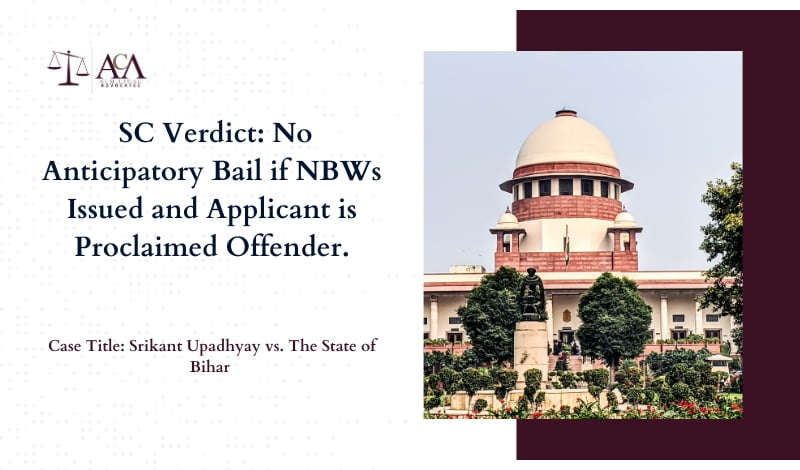In a landmark judgement, the Supreme Court of India has specified the conditions under which an accused is not entitled to anticipatory bail, especially when a non-bailable warrant and a proclamation under Section 82(1) of the Criminal Procedure Code (Cr.P.C.) are in effect against them. This clarification came in the case of SRIKANT UPADHYAY VS. THE STATE OF BIHAR, Criminal Appeal No. of 2024 (Special Leave Petition (Crl.) No.7940 of 2023), decided on March 14, 2024, where the appellants were denied pre-arrest bail by the apex court.
Background of the Case
The crux of the case lies in the non-appearance of the accused, Srikant Upadhyay, before the trial court despite various judicial directives aimed at securing his attendance. The series of judicial commands initiated with the issuance of summons, following the registration of an FIR No.79 of 2020 against the accused. When the summons failed to compel Upadhyay’s court appearance, the trial court escalated the matter by issuing a bailable warrant.
However, the accused’s continued defiance led to a more severe measure: the issuing of a non-bailable warrant. The court’s order for appearance, signalled that bail would not be readily available upon arrest.
The situation intensified when even the non-bailable warrant could not ensure the accused’s presence before the court. Consequently, the trial court took a decisive step by issuing a proclamation under sections 82 and 83 of the Cr.P.C., thereby declaring Srikant Upadhyay a proclaimed offender/absconder.
In a parallel development, Upadhyay filed an application for anticipatory bail before the Hon’ble High Court. The High Court denied the anticipatory bail, citing the serious nature of the accused’s non-compliance as demonstrated by the pending non-bailable warrant and the proclamation against him.
Faced with this adverse decision, Upadhyay escalated the matter to the Supreme Court, sparking a legal examination of the interplay between anticipatory bail entitlements and the consequences of defying judicial orders.
In this intricate backdrop, the Supreme Court was tasked with determining whether an accused, marked by a non-bailable warrant and proclamation for evading court proceedings, is entitled to the protective ambit of anticipatory bail under Section 438 Cr.P.C.
Supreme Court’s Examination and Verdict
The Supreme Court, led by Justices C.T. Ravikumar and Sanjay Kumar, embarked on a thorough examination of the legal and procedural facets presented by the case.
The primary question before the Court was whether an individual, against whom a non-bailable warrant and a proclamation under Sections 82/83, Cr.P.C. have been issued, could still be considered eligible for anticipatory bail?
The appellants’ counsel, Senior Advocate R. Basant, argued that the Hon’ble High Court had erred in dismissing the anticipatory bail application outright, without assessing the merits.
- He contended that the appellant was not intentionally defying arrest but was exercising his lawful right to seek anticipatory bail.
- The counsel emphasized that the anticipatory bail application had been filed before the issuance of the non-bailable warrant and proclamation, arguing that the application should be considered on its merits regardless of subsequent developments.
The Supreme Court highlighted the fundamental principle that anticipatory bail is an exceptional remedy, not a right. The bench referred to past verdicts, notably Prem Shankar Prasad v. State of Bihar and Anr. and Lavesh v. State (NCT of Delhi), which established clear guidelines for the issuance of anticipatory bail, especially in circumstances where the accused evades judicial proceedings.
The Court noted, “Thus, it is obvious that the position of law, which was being followed with alacrity, is that in cases where an accused against whom non-bailable warrant is pending and the process of proclamation under Sections 82/83, Cr.P.C. is issued, is not entitled to the relief of anticipatory bail.”
The Supreme Court addressed the misuse of anticipatory bail applications as a legal shield by absconding accused. It concurred with the Gujarat High Court’s judgement in Savitaben Govindbhai Patel & Ors. v. State of Gujarat, which clarified that merely filing an anticipatory bail application does not equate to legal appearance under the proclamation process.
Rejecting the notion that the filing of an anticipatory bail application could stall or negate the procedural advancements under Section 82 Cr.P.C., the Court held that the absence of any interim protection order does not prevent the Trial Court from proceeding with steps for proclamation and subsequent actions under Section 83, Cr.P.C., in accordance with the law.
Conclusion and Legal Implications
In light of the facts and principles, the Supreme Court found no grounds to interfere with the High Court’s judgement. The Court concluded that the appellant’s conduct, marked by consistent non-compliance and evasion from legal proceedings, rendered him ineligible for the privilege of anticipatory bail.
The verdict in SRIKANT UPADHYAY VS. THE STATE OF BIHAR sets a pivotal legal precedent, reinforcing the message that anticipatory bail cannot serve as a refuge for those who flout court orders and undermine the judicial process. The judgement serves as a stern reminder of the judiciary’s commitment to uphold the law and ensures that legal protections such as anticipatory bail are not misused to evade justice.






